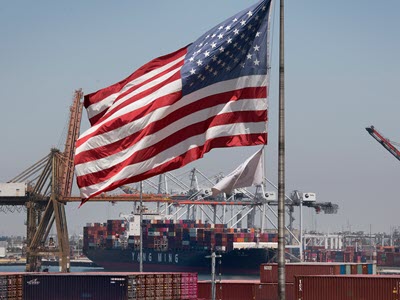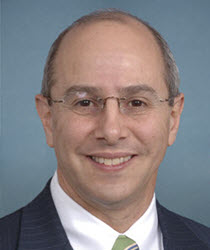Challenges for U.S. Trade Policy in 2021
A Brief Look Ahead
In this commentary for NBR’s Center for Innovation, Trade, and Strategy, Charles W. Boustany Jr. argues that a renewed focus on trade policy is central to restoring U.S. leadership. Congressman Boustany is the co-author with Aaron L. Friedberg of the NBR Special Reports “Partial Disengagement: A New U.S. Strategy for Economic Competition with China” and “Answering China’s Economic Challenge.”
With the transition process for President-elect Joe Biden underway, the new administration is facing the daunting prospect of more than 10 million Americans still out of work, a national unemployment rate of 6.7%, and a budget deficit of around 15% of GDP. The toll on the economy and human lives rages on. Over 14 million Americans have been afflicted with Covid-19, with deaths now exceeding 285,000 individuals in the United States and hospitalizations setting new records. By necessity, the incoming Biden administration will place intense focus on a robust response to quell the pandemic and its domestic economic fallout until vaccines on the horizon are readily available and widely distributed.
The Biden administration will, without doubt, seek to advance a comprehensive package of emergency economic measures to offer broad support to the domestic economy. This support will likely include assistance for struggling individuals, families, and businesses as well as for state and local governments. These measures are urgent but should be coordinated with broader economic policy to smoothly transition from emergency response to full recovery. They will also need to address the priorities defined by President-elect Biden during his campaign: achieving sustained economic growth that widely benefits all Americans, fostering continued innovation, and rebuilding a strong middle class with open opportunities for all Americans. Aligning these goals with the stated objective of repairing international relations with allies—all part of restoring U.S. leadership—necessitates a renewed focus on trade policy.
PRIORITIES FOR U.S. TRADE POLICY
Trade policy is a significant part of U.S. foreign policy and of paramount importance for reasserting U.S. leadership. Yet it is also the nexus of foreign and domestic economic policy, affecting everything from supply chains down to the individual household. The Biden administration cannot afford to place trade policy on hold while focusing solely on the domestic economy. Planning and implementing a bold trade agenda that will bring the widest possible benefits for all Americans should be given immediate consideration as a key component of a “build back better” strategy. It will be essential for the success of this broader agenda.
This will not be an easy task given the intense political divisions in Congress—a reflection of the disparate regional and ideological views held by the electorate—that have complicated or stalled U.S. trade policy as international challenges continue to gather at an alarming pace. Policymakers need to prioritize conducting a full review of the challenges, both domestic and international, confronting U.S. trade policy and to chart a path forward.
The U.S. Trade Representative (USTR). In the early months of the new administration, confirmation of a USTR and senior personnel in the Office of the USTR will be essential for executing a full review of the status of trade policy while formulating plans for the new administration’s trade agenda. This annual assessment will be especially important in the first year of the Biden administration, given the centrality of trade policy for preventing supply chain disruptions during the pandemic, as well as the need for international cooperation for efficient vaccine distribution. Second, the implementation of the United States–Mexico–Canada Agreement (USMCA) will require ongoing attention and oversight. Third, the USTR must provide direction for dealing with unfinished negotiations with China, Japan, the United Kingdom, India, and Kenya and in disputes with the European Union. Fourth, a number of trade enforcement actions are underway that require oversight. Fifth, U.S. leadership is needed for addressing the impasse over electing a new director-general of the World Trade Organization (WTO) and for blazing a path for WTO reform, including plans to address the impasse in the dispute appeals process. These are just some of the issues that will immediately confront a newly confirmed USTR.
Trade Promotion Authority (TPA). TPA, which expires June 30, 2021, delegates authority to the USTR to negotiate trade agreements in exchange for detailed, ongoing cooperation and consultation with Congress. It also facilitates an expedited process for approval of signed trade agreements without amendment, thus meeting the requirement of shared constitutional responsibility for trade policy. As a more practical matter, TPA enhances the negotiating position of the USTR by providing assurance to negotiating countries that Congress is fully engaged and serious about a result that has a chance of full ratification. Without TPA, the U.S. trade agenda will stall, potentially creating the perception that the United States is vacating the field.
The law is thus a necessary facilitator of a vigorous trade agenda, while creating confidence in one of the most important elements of U.S. foreign economic policy. This is important so as to avoid transient executive agreements that tinker on the edge of trade policy, or worse are nullified by a successor in the White House. TPA also provides for thorough oversight of trade agreements by Congress to ensure that objectives are being met and enforced. By reinforcing the president’s negotiating authority with congressional support, TPA is important for asserting U.S. leadership internationally. For these reasons, reauthorization of the law should be an immediate priority for the incoming administration given its looming expiration date and the difficulties historically in securing passage by Congress.
Trade Adjustment Assistance (TAA). Another issue requiring the attention of the incoming USTR is TAA authority for worker eligibility and benefits to help those who lost jobs related to trade. The law is set to expire on June 30, 2021. Reauthorization of these programs has been considered a condition for granting TPA in the past and will likely be so again. In 2015, TAA reauthorization was contentious and nearly derailed TPA reauthorization. Building support for TAA in a narrowly divided Congress will take time and concerted effort.
Section 301 tariffs. The outgoing administration has used tariff authorities granted by Congress expansively, generating controversy. Modifications or restrictions on how a future administration uses these tariffs may be discussed during debate on TPA reauthorization. The Trump administration initially used its authority under the Trade Act of 1974 to investigate Chinese intellectual property theft and then imposed Section 301 tariffs on a list of Chinese products as a remedy. The expanded use of these tariffs and the ensuing trade war led the Trump administration into negotiating the phase-one trade deal with China that went well beyond the original enforcement measure. These ensuing negotiations were done outside the purview of TPA and, as a result, bypassed congressional consultation and oversight. Future trade negotiations should be done under TPA to create a more lasting agreement.
The USTR has also used Section 301 authority to address issues beyond traditional trade policy. For example, the USTR began a Section 301 investigation into whether Vietnam is manipulating its currency because of concerns at the Department of Commerce over the growing bilateral trade deficit and foreign exchange purchases by the State Bank of Vietnam in 2019. This use of Section 301 tariffs is controversial as a response to exchange rate policy decisions by a country and potentially creates a number of adverse trade consequences complicating resolution of the problem of undervalued currency. While currency misalignment is a concern, Congress has not thoroughly investigated options to effectively address it. Rather than resorting to reactive use of Section 301 tariffs, the Biden administration should evaluate more appropriate and effective policy options to recommend to Congress regarding currency misalignment and export subsidies.
Another controversial use of Section 301 authority has been the USTR’s threat to impose tariffs on France and other countries in response to the implementation of taxes on digital services. Rather than escalating trade disputes over a new area of taxation, the Biden administration will have to consider full engagement in the ongoing multilateral process underway at the OECD while consulting closely with Congress. An international agreement addressing the cross-border nature of the digital economy and how it should be taxed would be superior to creating a complex patchwork of tax policies and starting another trade war. The debate over taxes on digital services has initiated a broader debate about tax and trade policy requiring attention by both the USTR and the Department of the Treasury in consultation with Congress.
Section 232 Tariffs. Tariffs imposed by the Trump administration on U.S. allies under Section 232 of the Trade Expansion Act of 1962 have raised bipartisan ire in Congress. The absence of a national security threat and subsequent retaliatory tariffs by these allies have been viewed as detrimental to U.S. security and economic interests by many policymakers. As a result, bipartisan legislation has been introduced to remedy this perceived overreach by the executive branch. This legislation would amend Section 232 of the statute to require a congressional vote of approval before tariffs could be applied. It also authorizes the Department of Defense to conduct Section 232 investigations instead of the Department of Commerce and incorporates a definition of national security into the existing statute.
Though Section 232 investigations fall under the Department of Commerce, Congress is likely to raise this issue in the context of TPA reauthorization, making USTR engagement necessary given the trade retaliation caused by the use of these tariffs. It will be prudent for the Biden administration to have policy recommendations for Congress to consider. Controversy over the definition of national security as it relates to trade policy has provoked the need for reform because of the implications for the international economy and ultimately the security environment.
Trade agreements. Over the past four years, the international political economy has changed in ways that may prove harmful to U.S. interests. The combined effects of the United States’ withdrawal from the Trans-Pacific Partnership, the implementation of its successor (the Comprehensive and Progressive Agreement for Trans-Pacific Partnership) without U.S. involvement, and the entry into force of the EU-Japan Economic Partnership create the risk of less favorable terms for participation in supply chains for U.S. agriculture and manufacturing interests. These regional agreements also set standards for the digital economy without the United States’ input. The potential impact is particularly acute for smaller firms needing export markets for growth. The proliferation of preferential plurilateral trade agreements without U.S. participation, when combined with the indiscriminate use of tariffs and the paralysis of the WTO Appellate Body for dispute resolution without a proposal for reform, is detrimental for U.S. interests.
Over the past two decades, China has emerged as a leading trade partner with most countries. The Regional Comprehensive Economic Partnership (RCEP) was recently signed, bringing the ten members of the Association of Southeast Asian Nations (ASEAN) together with China, Japan, South Korea, Australia, and New Zealand. This step toward closer economic integration by lowering tariffs and creating uniform rules of origin for countries accounting for 29% of global GDP will likely have impacts on supply chains that disadvantage U.S. farmers and manufacturers over time. Furthermore, the RCEP can only serve to enhance China’s growing dominance in the Asia-Pacific as the United States has failed to match its security commitments with the robust economic presence needed to assure allies and partners in the region. As China continues to build on existing economic interdependence in the Asia-Pacific region through the RCEP and the Belt and Road Initiative, the USTR under the Biden administration must coordinate with other relevant executive branch agencies in developing and implementing a coherent strategic response.
The Covid-19 pandemic. Mounting a vigorous economic recovery from the ravaging effects of Covid-19 rightly deserves the immediate attention of the Biden administration alongside the public health response to the pandemic. A whole-of-government approach clearly is needed. Ensuring that emergency measures serve longer-term objectives that broadly promote sustainable prosperity and a burgeoning middle class in the United States requires a robust trade agenda. If carefully crafted, trade policy could be pivotal in opening new markets and job opportunities for small businesses throughout the United States by facilitating direct export to foreign markets or integration into supply chains. In this way, trade policy might play a significant role in helping both minority-owned businesses and businesses in rural communities achieve the elusive American dream.
CONCLUSION
Rebuilding the legitimacy of U.S. leadership requires strengthening the internal fabric of America. Trade policy is the nexus of domestic economic policy and foreign economic policy, and if done well, it benefits the U.S. economy broadly. Smart economic statecraft entails aligning domestic economic interests with foreign economic goals to the benefit of both. This alignment would strengthen U.S. diplomacy in pursuit of extending American values and standards internationally—soft power—and ultimately reinforcing national and international security.
Charles W. Boustany Jr. is a Counselor at NBR. He retired from the U.S. Congress after serving from 2005 to 2017. Congressman Boustany is the co-author with Aaron L. Friedberg of the NBR Special Reports “Partial Disengagement: A New U.S. Strategy for Economic Competition with China” and “Answering China’s Economic Challenge: Preserving Power, Enhancing Prosperity.”




